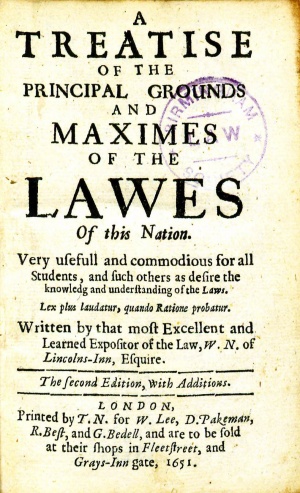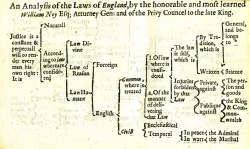Difference between revisions of "Treatise of the Principal Grounds and Maximes of the Lawes"
(New categories.) |
(Summary paragraphs by Sara Greenblum.) |
||
| Line 1: | Line 1: | ||
| − | {{DISPLAYTITLE:''A Treatise of | + | {{DISPLAYTITLE:''A Treatise of the Principal Grounds and Maximes of the Lawes''}} |
| + | <big>A Treatise of the Principal Grounds and Maximes of the Lawes of This Nation: Very Usefull and Commodious for All Students and Such Others as Desire the Knowledge and Understandings of the Laws</big> | ||
===by William Noy=== | ===by William Noy=== | ||
__NOTOC__ | __NOTOC__ | ||
| − | + | {{BookPageInfoBox | |
| − | + | |imagename=NoyTreatisePrincipalGroundsMaximesLawes1651TitlePage.jpg | |
| − | + | |link=https://catalog.swem.wm.edu/law/Record/2094080 | |
| − | + | |shorttitle=A Treatise of the Principal Grounds and Maximes of the Lawes | |
| − | + | |vol= | |
| − | + | |author=William Noy | |
| − | + | |editor=First Last | |
| − | + | |trans=First Last | |
| − | ''' | + | |edition=2nd, with additions |
| − | + | |publoc=London | |
| − | + | |publisher=Printed by T.N. for W. Lee, D. Pakeman, R. Best, and G. Bedell | |
| + | |year=1651 | ||
| + | |set= | ||
| + | |pages=159 | ||
| + | }}[http://en.wikipedia.org/wiki/William_Noy William Noy] (1577-1634) was an English barrister who was appointed by Sir Francis Bacon to be an official recorder for the courts of common law. During this time, Noy joined others in an attempt to review English statute law. In 1621 he became a leading figure in Parliament. From 1631-1634 Noy served as attorney general and these three years were marked by controversy.<ref>James S. Hart Jr, [http://www.oxforddnb.com/view/article/20384 "Noy , William (1577–1634)"] in ''Oxford Dictionary of National Biography'' (Oxford University Press, 2004- ), accessed October 9, 2013.</ref> His death in 1634 was received with mixed feelings because while many colleagues held him in high regard, many were displeased by his surly and discourteous personality.<ref>Ibid.</ref> "Perhaps his greatest legacy was the learning he passed on to the subsequent generation of lawyers. Among his pupils were Sir Orlando Bridgman, Sir John Maynard, and most notably, Sir Matthew Hale."<ref>Ibid.</ref><br /> | ||
| + | <br /> | ||
| + | [[File:NoyTreatisePrincipalGroundsMaximesLawes1651Chart.jpg|left|thumb|250px|<center>An Analysis of the Laws of England.</center>]] | ||
| + | ''A Treatise of the Principal Grounds and Maximes of the Lawes in this Nation'', first published in 1641, was originally written in French and "translated by a person who was neither well acquainted with the language of the work, nor understood the subjects of which it treated. The defective translation continued to be reprinted until [W. M.] Blythewood's edition" in 1817.<ref>J. G. Marvin, ''Legal Bibliography or a Thesaurus of American, English, Irish, and Scotch Law Books'' (Philadelphia: T. & J. W. Johnson, Law Booksellers, 1847), 542-543.</ref> Noy "was a profound laywer, and his maxims and observations, notwithstanding the disadvantages under which they labored, have always been regarded as 'a collection of reputation and authority.'"<ref>Ibid, 543.</ref> | ||
==Evidence for Inclusion in Wythe's Library== | ==Evidence for Inclusion in Wythe's Library== | ||
| − | |||
==Description of the Wolf Law Library's copy== | ==Description of the Wolf Law Library's copy== | ||
View this book in [https://catalog.swem.wm.edu/law/Record/2094080 William & Mary's online catalog.] | View this book in [https://catalog.swem.wm.edu/law/Record/2094080 William & Mary's online catalog.] | ||
| − | + | ==References== | |
<references/> | <references/> | ||
Revision as of 14:38, 25 October 2013
A Treatise of the Principal Grounds and Maximes of the Lawes of This Nation: Very Usefull and Commodious for All Students and Such Others as Desire the Knowledge and Understandings of the Laws
by William Noy
| A Treatise of the Principal Grounds and Maximes of the Lawes | |
|
Title page from A Treatise of the Principal Grounds and Maximes of the Lawes, George Wythe Collection, Wolf Law Library, College of William & Mary. | |
| Author | William Noy |
| Editor | First Last |
| Translator | First Last |
| Published | London: Printed by T.N. for W. Lee, D. Pakeman, R. Best, and G. Bedell |
| Date | 1651 |
| Edition | 2nd, with additions |
| Pages | 159 |
William Noy (1577-1634) was an English barrister who was appointed by Sir Francis Bacon to be an official recorder for the courts of common law. During this time, Noy joined others in an attempt to review English statute law. In 1621 he became a leading figure in Parliament. From 1631-1634 Noy served as attorney general and these three years were marked by controversy.[1] His death in 1634 was received with mixed feelings because while many colleagues held him in high regard, many were displeased by his surly and discourteous personality.[2] "Perhaps his greatest legacy was the learning he passed on to the subsequent generation of lawyers. Among his pupils were Sir Orlando Bridgman, Sir John Maynard, and most notably, Sir Matthew Hale."[3]
A Treatise of the Principal Grounds and Maximes of the Lawes in this Nation, first published in 1641, was originally written in French and "translated by a person who was neither well acquainted with the language of the work, nor understood the subjects of which it treated. The defective translation continued to be reprinted until [W. M.] Blythewood's edition" in 1817.[4] Noy "was a profound laywer, and his maxims and observations, notwithstanding the disadvantages under which they labored, have always been regarded as 'a collection of reputation and authority.'"[5]
Evidence for Inclusion in Wythe's Library
Description of the Wolf Law Library's copy
View this book in William & Mary's online catalog.
References
- ↑ James S. Hart Jr, "Noy , William (1577–1634)" in Oxford Dictionary of National Biography (Oxford University Press, 2004- ), accessed October 9, 2013.
- ↑ Ibid.
- ↑ Ibid.
- ↑ J. G. Marvin, Legal Bibliography or a Thesaurus of American, English, Irish, and Scotch Law Books (Philadelphia: T. & J. W. Johnson, Law Booksellers, 1847), 542-543.
- ↑ Ibid, 543.

